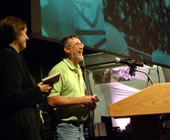| Tipton
Named MacArthur Fellow |
|
Warmest congratulations to Jennifer Tipton on her latest honor, being named a 2008 MacArthur Fellow from the The John D. and Catherine T. MacArthur Foundation. Sometimes called the "genius" awards, each fellowship comes with a stipend of $500,000 to the recipient, paid out in equal quarterly installments over five years.. Ms. Tipton was on the 1987 PQ Steering Committee which won the Prague Quadrennial Golden Triga award. The 1987 PQ Steering Committee won the USITT Award in 1990. She was recognized individually with the USITT Award in 2002.
The MacArthur Foundation,
in announcing the honor said “Jennifer Tipton is an internationally
recognized lighting designer whose distinctive designs have
redefined the relationship between lighting and performance.”
To
Top  |
| Lefko
Gives Keynote |
|

Photo/R. Finkelstein
|
USITT
President Carl Lefko presented the Keynote for an enthusiastic audience
at the Chesapeake Regional Section's recent meeting and Stage Expo at
Towson Univeristy in Maryland. Membership & Ad Sales Manager Michelle
Smith, from USITT's National Office, also participated, including making
sure those in attendance had information about the benefits of belonging
to the Institute.
A full report of the event is expected in the November
issue of Sightlines.
To Top 
|
| Launches
Director-Designer Showcase |
|
OPERA America, the national service organization
for opera, announces a bi-annual Director-Designer Showcase
under the auspices of The Opera Fund. The Showcase will offer
direct benefits to promising stage directors and designers
seeking to break into the world of opera. It is intended to
bring new talent to the forefront, and connect promising directors
and designers with those who are in a position to engage them.
For more information, click
here.
The Showcase is open to emerging opera/theater
artists regardless of their membership status with OPERA America.
To
Top  |
| Groener Joins
Tim Hunter Design |
|
Tim Hunter Design recently announced that Bill
Groener will join the firm as president and chief operating officer. Mr. Groener
is former vice president/general manager of Production Resource Group.
Early in his career, he worked primarily in design
and production in both regional and academic theatre. After working as
an assistant professor at Williams College, he joined the Walt Disney
Company as a lighting designer for theme park projects. After Disney,
he moved away from design and production and toward the manufacturing
side, primarily with Strand Lighting where he eventually worked as executive
vice president/general manager. For the past 14 years, he worked with
first Barbizon and later PRG.
To Top 
|
| Broadway
Design First to Use Systems |
|
USITT Fellow Richard Pilbrow's new
lighting design for A Tale Of Two Cities is the first Broadway
production to integrate Strand Lighting's Light
Palette VL (with Universal Attribute Control)
with Cast Lighting's WYSIWYG and West Side Systems'
Virtual Magic Sheet for what is being called
a more dynamic, intuitive and designer-friendly
graphic representation of the output and orientation
of the lighting rig. The show premiered September
18 at the Al Hirschfeld Theatre.
Mr. Pilbrow
configured a video display to indicate, graphically
and in real time, levels and positions of lights. He cued the show (with
over 1,300 control channels of moving and conventional fixtures, LED's, fiber-optics,
special effects and over 80 radio-controlled battery-powered instruments)
without any other display from the lighting console, working alongside
the actors as they rehearsed onstage.
To Top 
|
| Light Totem
in Indiana |
|
Congratulations to Robert Shakespeare of
Indiana University whose "Light Totem" is about to celebrate its own
anniversary, lighting up the sky at the
IU Art Museum building. The 70-foot freestanding
tower on the museum lawn includes LEDs reflecting
off the aluminum tower, capped by a 208 million
candle-power searchlight. Mr. Shakespeare can
program the totem to perform choreographed sequences
of up to 25 minutes, and has been drawing people
who stand in awe as the totem lights the night.
It uses about 3,000 watts of energy
compared to the 30,000 to 40,000 which would
be needed for more traditional light sources. Duke Energy is the exclusive
corporate sponsor of the project.
To Top 
|
|
|


